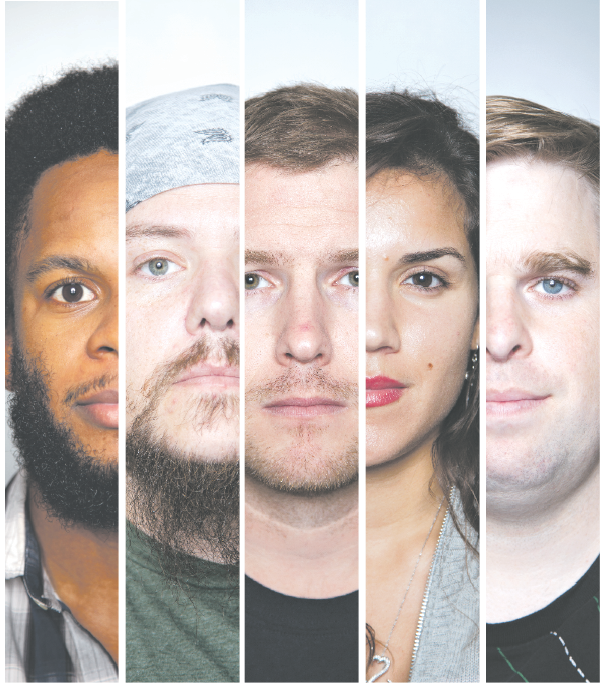For a small population of UT students, campus life comes with several realizations — being the oldest student in class or that, unlike their peers, they are balancing a family life and their studies.
Student veterans share similar backgrounds, having completed their military service and returning to civilian life. But the reintegration process has proven to be an individual experience during which veterans adapt to student life outside of strict schedules and uniforms, facing a range of stereotypes and confronting personal challenges.
“It’s an intersection of being [nontraditional] students, being older and being transfer students,” Jeff Moe, UT’s veterans affairs outreach coordinator and mental health counselor, said. “They have the same issues as other transfer students adjusting to this campus, but many also have families and are trying to balance family life with being a full-time student and, sometimes, trying to maintain a job as well.”
UT’s student veterans are typically older than the average student. Only 11 percent are between the ages of 21 and 24, while more than half are between 25 and 30 years old, according to Student Veterans Services.
For Adam Wagner, a health promotion sophomore and student veteran, interactions with other students are limited because of the few things they have in common.
“Adapting to student life is still difficult because of the disconnect,” Wagner said. “There is a decade of age between me and other students. I’m 32. I am older, and I have a family, and I’m sure they don’t want to hear about my six-year-old’s soccer game.”
The little time Wagner spends on campus outside of class is consumed by working in the Student Veteran Services office.
“I look at [school] differently, I don’t live on campus or around here, so, to me, it’s a job,” Wagner said.
Aside from the age difference, most student veterans also have previous college experience — 99 percent of UT’s student veterans are transfer students and 98 percent transfer from Austin Community College. On average, student veterans have attended more than two colleges or universities before continuing their undergraduate degrees at UT and usually arrive on campus having completed nearly half their required degree hours.
Moe said a majority of the issues student veterans face while reintegrating into their communities are not uncommon issues on a college campus.
“I see a lot of depression and anxiety, but that’s not a whole lot different from other students in general,” Moe said.
Student Veterans Services director Ben Armstrong said some student veterans struggle with lack of structure outside of the military and often take some aspect of military life with them after they leave service.
“They lived a very dogmatic, structured culture, based on heavy enforcement of rules and very parsed out services,” Armstrong said. “We joke that all of us in the military wear clothes very close to drab green, because that’s what our uniform was, and we’re comfortable in that.”
Wagner said the transition from a military routine left him with extra time on his hands, but the laid-back campus atmosphere can, at times, be frustrating.
“You don’t really know what to do,” Wagner said. “You’re so used to having a task that needs to be done by 6 a.m. Now you’re here and there is a lot of sitting around, which is unheard of there.”
Reintegration comes with additional challenges for disabled student veterans whose transition to college life includes physical recovery.
“I’m disabled so I pretty much do what I can then go home and take pain pills,” anthropology junior John Marchi said. “When my school day is over, I’m done. I’m wiped out.”
The reintegration process is different for some female veterans who make up less than one-fifth of UT’s student veteran population, though women make up almost one-third of student veterans nationally.
Nursing sophomore Gabrielle Evans said her reintegration experience was molded by the residual effects of gender discrimination and sexual harassment she faced while in the military.
“I went through a lot of sexual harassment in the military, so I have a really hard time dealing with what happened when I was in the military,” Evans said. “Most of the men will have an easier time adjusting than any woman … because I have a hypersensitivity [to] it, I expect that out of guys and the student population in general.”
Student veterans often encounter a variety of stereotypes, ranging from their political beliefs to mental health.
“You hear ‘sir’ a lot, and it’s out of respect,” Wagner said. “But a lot of times sitting around in classes, I’m starting to get the impression that they think we’re all either crazy, pissed off, disabled and we’re here on benefits.”
Wagner said veterans are often portrayed as broken people who struggle in civilian life.
“I’m a veteran, I’m a strong individual, don’t portray me as weak and being taken advantage of,” Wagner said. “We’re supposed to be labeled as strong individuals to begin with, that’s why we represent the nation in the armed forces. It creates a bad public opinion of a veteran.”
There are some factors to help ease with reintegration. Texas is one of 20 states that provide in-state tuition eligibility to veterans, their spouses and their dependents, regardless of previous residency, making their education more affordable. UT also created the Student Veterans Services office in 2011 to assist students with transitional paper work, combat stress and social isolation, which veterans commonly deal with.
But UT’s student veteran population of about 600 students only makes up a little more than 1 percent of the student population while veterans make up 4 percent of undergraduates and graduates nationwide, according to the U.S. Department of Education.
Armstrong said the Student Veterans Services office serves as a “safe place” on campus where student veterans can meet “like-minded” individuals, creating a space on campus similar to those for other minority groups.
“We all have similar experience of some sort — if nothing else, every vet had the experience of basic [training], so it’s something to talk about,” Marchi said.
Some veterans say their military experience helps them find areas of interest on campus. For Marchi, learning about foreign cultures in the military lead to his anthropology degree.
“I’m kind of a people watcher,” Marchi said. “Part of that is probably due to the military, you’re kind of taught to pay attention to things, but I’ve taken it somewhere else. I notice little things that other people don’t. When I watch people it’s amusing.”
Though his hostile days of military action are behind him, Marchi said his military service has since changed his perspective, including his view of campus life.
“I get bored really easily now,” Marchi said. “Everything kind of moves slower. If you could imagine colors being washed out and life being that way: [It’s] kind of like that now. I’m constantly looking for something to liven it up.”





















